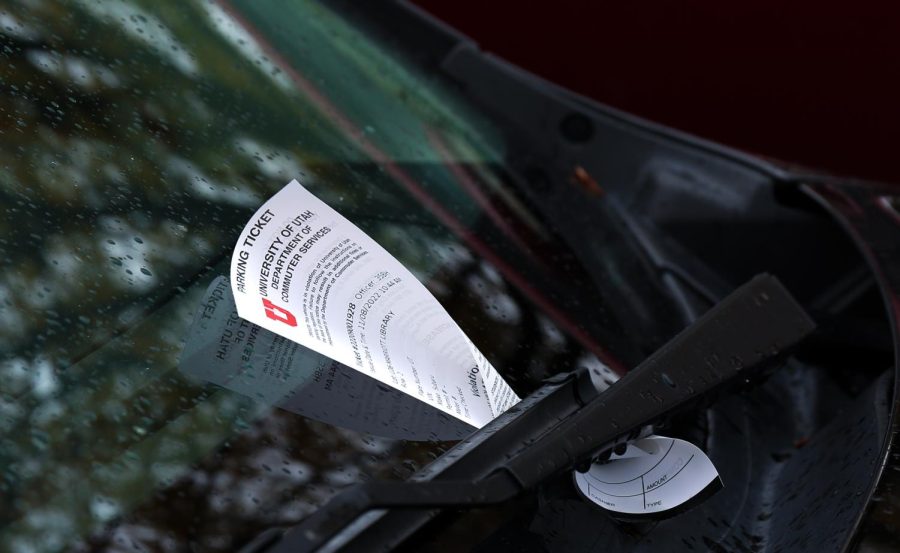Mendenhall: Parking Enforcement Must Change
A parking ticket on a car at the Marriott Library parking lot at University of Utah in Salt Lake City on Tuesday, Nov. 8, 2022. (Photo by Julia Chuang | The Daily Utah Chronicle)
November 10, 2022
For years, students have had problems with the University of Utah’s parking enforcement. Whether parking in student-designated areas (“U” permit spots) or pay lots, most students with a car on campus have likely received a violation of some kind. Parking enforcement employees are notorious for leaving parking tickets at any hour of the day. Last year, I received a ticket at 7:30 a.m. for not parking in my assigned dorm room lot.
Many students have become quite familiar with the appeals process, which is far from perfect. For example, most students who appeal a ticket should expect to have an answer within 10 days or less, even though it’s expected to pay a ticket immediately. Some aspects of parking enforcement need to drastically change. Students should not have to worry about unjust ticketing and consequences as a result.
How Does the Process Work?
Ticket appeals tend to be a relatively simple process. You need to either have the actual ticket number or your license plate number and state. After you submit an appeal, it can take anywhere up to 10 days to hear back from commuter services. While frustrating, students are also expected to pay for their tickets promptly upon receiving them. If they do not comply, the price increases over each additional 10-day period. We already pay the U a great deal of money in the form of tuition, but they keep finding opportunities to charge us more.
Those responsible for the appeals process must try to make sound decisions based on the minimal information collected by officers. This information includes pictures of license plates or car windows and timestamps to prove their validity. These few images sometimes misrepresent the situation entirely, and students usually don’t think to take their own pictures to refute theirs. Solomon Brumbaugh, the transportation demand manager at the U, confirmed that “… as part of the ticket, we take a photo of the vehicle in violation and as much as possible, the officer tries to capture why they wrote the ticket.”
However, parking enforcement officers make mistakes like anyone else. “Sometimes someone will just appeal not even knowing it’s invalid, and we will let them know, ‘oh, that was an officer’s error, by the way, we waived that ticket,’” Brumbaugh said. He stated that about 60,000 parking tickets and warnings have been issued since the beginning of the year. Of those 60,000, only 28% of them got appealed. Of those appealed, they grant leniency to about 44%.
If an appeal is denied, students can submit parking tickets for a second-level appeal, but only after they pay the ticket fee. This process seems extremely backwards, particularly when you consider that the parking ticket might still be fully or partially refunded. Second-level appeals then go to the Parking Appeals Committee, which only meets “up to once a month.” The U should address the many obvious shortcomings of this appeals process and consider effective changes to better serve their students.
Why Should We Change Anything?
The appeals system has many forces working against it, including a lack of time and employees, a surplus of students submitting appeals and lack of support from the student body. By occasionally ticketing students incorrectly and refusing to take on-campus safety seriously (due to parking-related issues), commuter services make it hard for us to support their objectives. Parking far away from buildings late at night poses a serious threat to students. Especially when we receive many alerts of dangerous situations on campus, like attempted assaults and bomb threats. This makes me extremely cautious whenever I’m on campus. Parking far away from my classes or the Chronicle office heightens my anxiety and makes me feel significantly less safe. But at this point, I’d rather risk that than deal with any hassle. Plenty of fellow students share these feelings, which means it’s about time to address the root of the parking issue.
When students receive a notice of violation, many of us appeal because it’s easier to fight a ticket than stomach the idea of paying the fine. Students appeal tickets to avoid paying for them, which defeats the entire purpose to begin with. Ticketing should discourage violation of university policies. And while the cost of a parking ticket may seem relatively low ($30 for a pay lot violation), it’s just an additional form of income for the U. We’re all sick of the ticketing. It doesn’t seem to correct behavior and violations unnecessarily exploit students for more money throughout the school year.
What Can We Do?
Student voices must be heard. The U prides itself on advocating for students and staying in-tune with their needs. This is the time to show that dedication. We should begin by either improving or increasing the staff of the appeals office. For the two tickets that I have (appropriately) appealed this semester, I got the same impersonal response with little to no valid explanation. When I asked Brumbaugh why the response was short, I was told that, “there is this, like, level of coldness because we have … pre-prepared responses.” After appealing, I received an email stating, “A report was run and payment for the vehicle could not be found.” Upping the staff, or even training current employees to be more up-to-par, could really improve how they address additional comments, questions and concerns that students have about their violations.
We students are sick of the parking violations and tickets. They do nothing for us or the campus. Addressing the problem is in the best interest of both the commuter services board and administration alike.









